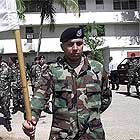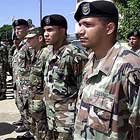|
 |
|
Esta página no está disponible en español. Orlando Sentinel In Puerto Rico, Soldiers Prepare To Prove Mettle By Matthew Hay Brown | San Juan Bureau February 16, 2003
In Aguadilla, Puerto Rico. (RICARDO FIGUEROA FOR THE ORLANDO SENTINEL) ---------- AGUADILLA, Puerto Rico -- Spc. Juan Barreto was training here last week when his sergeant broke the news. Just months after returning from the Pentagon, where they spent a year recovering human remains and sorting personal effects from the attack of Sept. 11, 2001, their Army Reserve unit was being activated again, this time to prepare for deployment to parts unknown. "At first, I had kind of confused feelings," said Barreto, a police officer in San Juan. "I have a 3-year-old son. But our nation calls, and I feel proud to answer." As President Bush moves toward war with Iraq, Barreto is one of thousands of soldiers joining a mobilization unprecedented in this U.S. commonwealth. Hundreds of military reservists have been activated alongside the largest National Guard call-up in island history. The mobilization once again lays bare the complicated relationship between Puerto Ricans and the U.S. military, the force that invaded the Spanish island in 1898, occupied it for decades, inspired protests and attacks -- and has attracted hundreds of thousands of loyal recruits. ---------- Listen up. (RICARDO FIGUEROA FOR THE ORLANDO SENTINEL) ---------- Should the United States go to war, island soldiers will again fight in a military that has not always treated them equally, for a commander-in-chief they did not elect, authorized by a Congress in which they have no vote. And yet they continue to enlist, earn decorations and suffer casualties, often at levels disproportionate to their numbers. The island would rank 27th among states in population but boasts the 17th-largest National Guard. The percentage of reservists exceeds the national average, and a higher proportion has been activated. "Since we are so proud to be Americans, we want to demonstrate that we are willing to sacrifice everything for the values we hold dear to our hearts," Lt. Col. Hector López said. "It's also an opportunity to show other Americans that we as Puerto Ricans truly love America, that we're good enough, that we deserve to be called Americans." Another Guard call-up Officials last week announced the call-up of 2,190 troops of the Puerto Rico National Guard to join 1,000 others deployed since January. The units include a brigade of engineers that Brig. Gen. Francisco Márquez said would face combat if sent to war, as well as infantry and support troops. In all, 4,700 Guard soldiers -- more than half the commonwealth's 8,500-strong force -- have joined the war on terror. The Army Reserve, meanwhile, has activated 1,600 soldiers from Puerto Rico. Nearly 2,000 of the island's 6,000 reservists have been called since Sept. 11, 2001. "For a mission like this, you want to send your very best units," said Brig. Gen. José Rosado, commander of the Army Reserve in the commonwealth. "I can assure you, these are the best." Minorities in the United States have long sought economic gain and social acceptance through service in the military. For Puerto Ricans, the institution also has proved a means to express a dual patriotism, a commitment both to their island and to the larger United States. Special shoulder patch Rosado points to the patch on his left shoulder, an insignia worn by island soldiers. It shows a garita, the watchtower characteristic of the forts built by Spain to defend what was for centuries a military outpost. "Our service combines our Spanish heritage with our military traditions," he said. "We love to serve our nation. We don't have a problem recruiting soldiers, and we don't have a problem retaining them." Puerto Rican service in the U.S. military dates almost to the invasion of the island during the Spanish-American War. Within a year of the occupation, Congress had formed the Puerto Rico Battalion of Volunteer Infantry; successor units have served in every major action since World War I. Islanders still talk of the all-Puerto Rican 65th Infantry Regiment, the Borinqueneers praised by Gen. Douglas MacArthur for their valor in combat during the Korean War. "The Puerto Ricans forming the ranks of the gallant 65th Infantry give daily proof on the battlefields of Korea of their courage, determination and resolute will to victory, their invincible loyalty to the United States and their fervent devotion to those immutable principles of human relations which the Americans of the Continent and Puerto Rico have in common," MacArthur wrote in 1951. "They are writing a brilliant record of heroism in battle, and I am indeed proud to have them under my command." Proving themselves "It happens among many minority groups," said Ernest Acosta Jr., director of the Puerto Rican-American Research Institute and an Army veteran. "They get to war, and they want to prove themselves." Gina M. Pérez, a researcher at the Center for Puerto Rican Studies at Hunter College in New York, said the military may offer Hispanics a means to earn a salary, pursue education and gain prestige within their own communities and beyond. "There's the performance of patriotism, the promise of really belonging and the honor of serving," Pérez said. "Puerto Ricans a lot of times get labeled in the predominant media as only taking away from the state, as people who don't contribute. Maybe on a subconscious level, this is a way of demonstrating a sharing of sacrifice." Large peace movement Perhaps paradoxically, the island also boasts an unusually robust peace movement -- a key element in the broadly supported and ultimately successful campaign to end the Navy practice bombing on the island of Vieques. The Navy announced last month that it would quit the firing range as Pentagon officials and Washington politicians grumbled. The carrier battle group Theodore Roosevelt wrapped up what the Navy said would be the final round of training last week. Some of the activists involved in that confrontation also have led demonstrations against a war on Iraq. But island politicians who joined them on Vieques have tried since to repair relations with the military. "Let it be clear that today and throughout our history, Puerto Ricans have defended democracy and freedom by paying the ultimate price on the battlefield," Resident Commissioner Aníbal Acevedo Vilá, the island's nonvoting delegate to Congress, wrote last month to President Bush. "Puerto Rican commitment to national defense remains resolute." Gov. Sila M. Calderón, an outspoken critic of the exercises on Vieques, has stressed that she opposed the bombing, not the Navy. Recently, she opened family-support centers throughout the island for residents whose loved ones had been called to service. "I feel a great pride as a Puerto Rican that our soldiers are disposed to defend with dignity and courage our values and our way of life," Calderón said. 'You are focused' Back in Aguadilla, the tropical sun pounds down on the palm-lined parking lot of the Army Reserve Center at the old Ramey Air Base. The soldiers of the 311th Quartermaster Company, wearing green jungle camouflage, black berets and combat boots, stand in formation before Gen. Rosado. "You have trained, and you are focused," the commander tells the young men and women in lightly accented English. "The most important thing now is that you do your job and come home safely." "Hoo-ah!" several whoop in the soldier's shout of affirmation. Then Rosado switches to the language more familiar to most here. "We have confidence in you," he continues in Spanish. "You always have carried the name of Puerto Rico very, very, very high." More whoops, louder still.
|

 ----------
----------